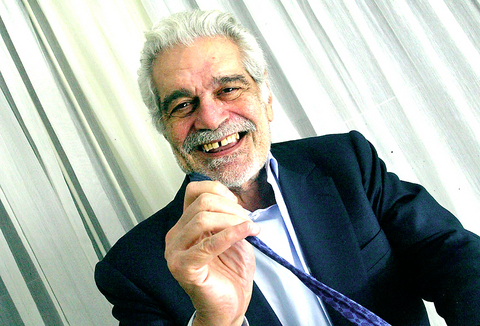Before striking out for the hills of Anatolia near the end, Monsieur Ibrahim, confines its attention to the Rue Bleue, a narrow, slightly shabby street in a working-class section of Paris. Adapted from Eric-Emmanuel Schmitt's novel (which was also made into a play), this modest, sentimental film looks nostalgically back on Paris in the mid-1960's and casts a loving, oblique glance at the French movies of that era.
At one point, Brigitte Bardot herself (played by a latter-day cinema sex goddess, Isabelle Adjani) shows up to shoot a few scenes on the Rue Bleue, where she wins the envious admiration of the local prostitutes.
For its part, Monsieur Ibrahim, written and directed by Francis Dupeyron, has a deci-dedly new wave look and feel, with street-level, hand-held cameras and bursts of French and English pop music on the soundtrack (including, as it

PHOTO: NY TIMES
happens, Richard Anthony singing the praises of the new wave in nouvelle vague).
Much of the music issues from a radio belonging to Momo (Pierre Boulanger), a Jewish teenager who lives in a state of low-intensity domestic war with his cold, depressive father (Gilbert Melki). In search of affection, and eager to grow up, Momo, at the start of the film, breaks open his piggy bank to purchase the services of a prostitute named Sylvie (Anne Suarez). While she and her colleagues function, in classic French-movie fashion, as both lovers and surrogate mothers, Momo also finds a second father in the person of Ibrahim (Omar Sharif), who keeps a small grocery store across the street from Momo's apartment.
The story of their cross-generational, cross-cultural friendship is introduced by an anthem to universal brotherhood (one of the musical specialties of those days) called Why Can't We Live Together? The question has hardly lost its pertinence, and Dupeyron, without overt didacticism, turns the story of an elderly Muslim and his young Jewish protege into a parable of tolerance and understanding.
The two central performances help the lesson go down easily, and Duperyon's unassuming, slightly ragged realism gives the movie a sweet, lived-in charm. Sharif, grizzled and white-haired at 71, has lost none of the charisma that made him an international movie star in the 1960's, and Boulanger, in his first feature film, shows impressive self-assurance. Sharif's character is, in some ways, a dubious conceit; he is the selfless repository of exotic Eastern wisdom whose main purpose in life is to shepherd his young friend through life's difficulties. In a Hollywood melodrama, Ibrahim would most likely be a spiritually gifted black man. But Sharif is a wry and subtle actor, and he gives the cliche some humor and life.

On April 26, The Lancet published a letter from two doctors at Taichung-based China Medical University Hospital (CMUH) warning that “Taiwan’s Health Care System is on the Brink of Collapse.” The authors said that “Years of policy inaction and mismanagement of resources have led to the National Health Insurance system operating under unsustainable conditions.” The pushback was immediate. Errors in the paper were quickly identified and publicized, to discredit the authors (the hospital apologized). CNA reported that CMUH said the letter described Taiwan in 2021 as having 62 nurses per 10,000 people, when the correct number was 78 nurses per 10,000

As we live longer, our risk of cognitive impairment is increasing. How can we delay the onset of symptoms? Do we have to give up every indulgence or can small changes make a difference? We asked neurologists for tips on how to keep our brains healthy for life. TAKE CARE OF YOUR HEALTH “All of the sensible things that apply to bodily health apply to brain health,” says Suzanne O’Sullivan, a consultant in neurology at the National Hospital for Neurology and Neurosurgery in London, and the author of The Age of Diagnosis. “When you’re 20, you can get away with absolute

May 5 to May 11 What started out as friction between Taiwanese students at Taichung First High School and a Japanese head cook escalated dramatically over the first two weeks of May 1927. It began on April 30 when the cook’s wife knew that lotus starch used in that night’s dinner had rat feces in it, but failed to inform staff until the meal was already prepared. The students believed that her silence was intentional, and filed a complaint. The school’s Japanese administrators sided with the cook’s family, dismissing the students as troublemakers and clamping down on their freedoms — with

As Donald Trump’s executive order in March led to the shuttering of Voice of America (VOA) — the global broadcaster whose roots date back to the fight against Nazi propaganda — he quickly attracted support from figures not used to aligning themselves with any US administration. Trump had ordered the US Agency for Global Media, the federal agency that funds VOA and other groups promoting independent journalism overseas, to be “eliminated to the maximum extent consistent with applicable law.” The decision suddenly halted programming in 49 languages to more than 425 million people. In Moscow, Margarita Simonyan, the hardline editor-in-chief of the